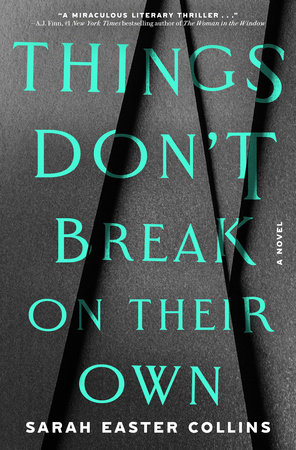READERS GUIDE
In order to provide reading groups with the most informed and thought-provoking questions possible, it is necessary to reveal certain aspects of the story line of this book. If you have not finished reading
Things Don’t Break on Their Own, we respectfully suggest that you do so before reviewing this guide.
1. Early on in the narrative, Robyn’s father explains that “There’s a Japanese process for mending pottery with tree sap which I’ve always wanted to try, where the cracks aren’t hidden away, but made a thing of, made deliberately visible. . . . The idea is that repairing something—something loved, something treasured—makes it even more beautiful. A nice idea, no? It’s called kintsugi.” How does this process mirror the themes explored in the novel?
2. What do you think about the use of multiple perspectives in the story? Which character resonated with you most?
3. Willa’s relationship with her father is very different from Laika’s. How does that influence the sisters’ bond—and the family dynamic in general?
4. “I didn’t mean to, but I kept thinking I’d seen her. She was everywhere. She’d be in a thick pack of younger girls ahead of me in a corridor or else running, a distant figure on the other side of the sports field. . . .” This is how Willa describes her life about a year after Laika’s disappearance. If you were in her shoes, do you imagine you’d be reacting this way? Why or why not?
5. Laika’s father has a choice—give her her passport or take her home. He states: “I earned my place at that table, and don’t they know it. Earned myself the cars, the watches, the beautiful wife. Earned my right to have everyone jumping up and down.” How does this illuminate your understanding of why he made the decisions he did?
6. Laika’s father always knew the truth about her disappearance. Why do you think he never revealed it?
7. After staying with Freida for a bit, Laika states: “I wasn’t going to stay away forever. Just a little bit longer, to make my point. Meanwhile, I was happier than I’d been in a long time. I felt safe.” What do you think convinced her to stay as long as she did before Freida passes? What do you think Laika defines as safe?
8. Claudette views her life as “a lie.” Do you see it as a lie? At what point does a life become one’s own?
9. Willa finds her sister’s dolphin necklace and confronts her mother. Why didn’t Willa’s mother tell the police about it?
10. Who would you cast in a movie version of Things Don’t Break on Their Own?

